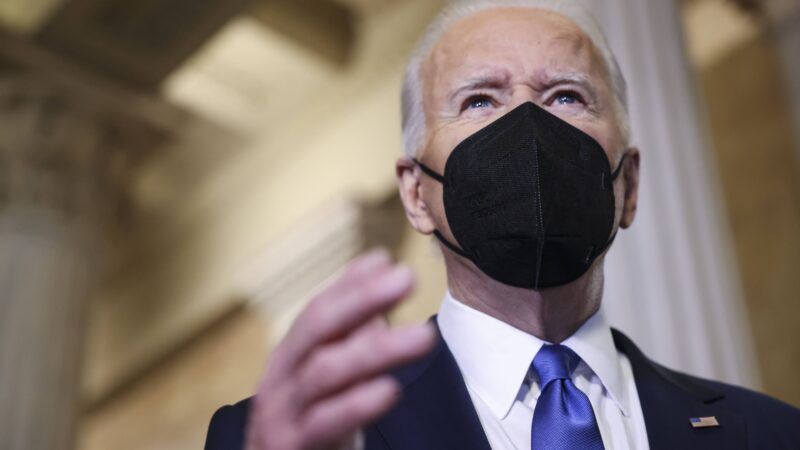The Government Hoarded 750 Million N95 Masks While Telling You To Wear One
And now that the omicron variant is in retreat, everyone gets them for free. Great timing, guys.

Later today, the White House is expected to officially announce plans to send roughly 400 million high-quality, N95 masks to pharmacies and health centers around the country. From there, the masks will be distributed for free to anyone who wants one.
The Associated Press reports that the move is meant to encourage Americans to replace cloth masks with alternatives that better defend against the Omicron variant of COVID-19. In places where mask-wearing is mandated by government policy, at least some people will surely be happy to swap out their current masks for the free N95s.
If the "free masks" plan tracks earlier plans for distributing "free" vaccines and "free" testing, then we know how this will go. Some pharmacies will run out immediately while others will still have some in stock when the next pandemic arrives.
But the timing feels all wrong. As The New York Times' David Leonhardt reported today, omicron is in retreat. Wouldn't it have made more sense for the White House to order the distribution of these masks months ago, when omicron first arrived on U.S. soil and federal officials started pushing Americans to wear N95 masks instead of basic cloth face coverings?
That, in turn, raises some serious questions about the national mask stockpile itself, which media reports say currently contains 750 million masks. If this is how they're going to be distributed, essentially to whoever wants one, rather than on the basis of need, what is the point of having a stockpile for emergencies? Markets are perfectly capable of handling the distribution of N95 masks.
For that matter, why is the government sitting on a stash of 750 million masks after two years where mask shortages have been a recurring problem? Keep in mind, every mask that went into the federal stockpile—that is, every mask that will now be made available "for free" via the White House's new program—is a mask that could have already been in use weeks or even months ago.
In fairness, it doesn't seem like the stockpile was that large in March 2020—Politico reports that federal officials have "have worked to replenish" the stockpile "since the earliest days of the Covid-19 outbreak." But it's worth asking whether replenishing that stockpile was really the best use of federal resources in the middle of an ongoing pandemic. For months, Biden and his top public health officials have been urging Americans to wear N95 (or the similar KN95) masks as a defense against the omicron variant, while apparently also removing millions of masks from the marketplace in order to replenish a federal stockpile—as if having a few hundred million masks in storage for a future pandemic is more important than using them to fight the current one.
America produced an estimated 1 billion high-quality masks last year, so we're no longer experiencing the dire shortages that marked the first year of the pandemic. Even so, masks haven't been as readily available as they could be. It was widely reported last year that some Americans were turning to counterfeit N95s because of the difficulties in purchasing the genuine article.
Just last week, Politico notes, Biden talked about how obtaining high-quality masks is still "not always affordable or convenient" for some individuals. Shouldn't his administration have to answer for contributing to that problem? Why was the federal government stockpiling masks at a time when those same masks were very much in demand?
All this accomplished was time-shifting the availability of masks. Because that's what a stockpile is meant to do: shift the availability of resources from a time when demand is low and supply is high to a time when there is a crunch in supplies.
It's certainly questionable whether this time shift was a productive one. The White House is making hundreds of millions of masks available now, after the omicron wave seems to have crested and started to recede in many parts of the country. If the distribution of masks from the federal stockpile takes as long as the White House's planned distribution of free COVID tests, they likely won't arrive in pharmacies and health clinics until early February.
So the operative question is: Are Americans better served by getting free masks in February than they would have been to have a higher number of N95 masks available for purchase in October, November, and December of this year? That equation does not seem to break in the Biden administration's favor.


Show Comments (48)